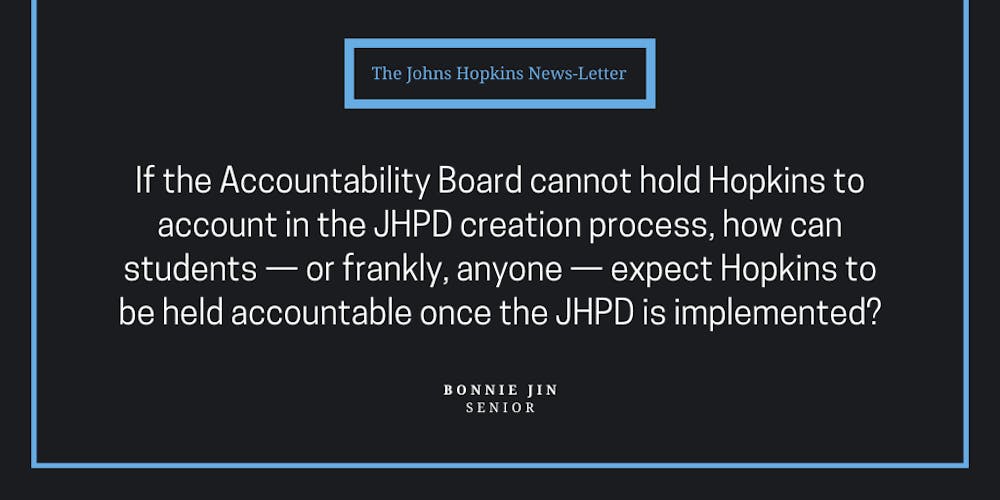Vice President for Public Safety Branville Bard sent an email to the Hopkins community on Dec. 2 announcing the final draft of the Memorandum of Understanding (MOU) between the Baltimore Police Department (BPD) and the University for the implementation of the Johns Hopkins Police Department (JHPD).
In the email, Bard stressed the importance of community involvement in amending the proposed MOU.
“[There were] 60 days for public and City Council review and comment, three Hopkins-sponsored town halls, nearly 30 individual and small group meetings, a town hall hosted by two City Council members, and well over 250 comments and questions submitted,” he wrote.
Along with the final draft of the MOU, Bard sent a report summarizing the engagement process and feedback on the MOU from 21CP Solutions, as well as a disposition report that lists the feedback submitted.
Bard noted that all specific suggestions for the MOU have been adopted in the final draft. In the email, he expressed his gratitude for the Hopkins community for their feedback and involvement in the process of drafting the MOU.
The University will be moving into the next phase of the implementation of the JHPD. Bard wrote that the next phase, which will take approximately six to 12 months, includes the development of department policies that follow the Community Safety and Strengthening Act and the MOU, the recruitment and training of JHPD officers and the establishment of JHPD operations.
Bard stated that the University plans on continuing community engagement during the next phase of implementation.
“We will continue to seek feedback from the community, receive oversight and guidance from the Johns Hopkins University Police Accountability Board, and post updates on our public safety website,” he wrote.
President of the Black Student Union Jayla Scott expressed her belief that no significant changes have been made to the final draft of the MOU in an email to The News-Letter.
“The University has been ignoring the concerns of members from the Hopkins and Baltimore community about implementation of JHPD since it was announced in 2018,” they wrote. “[The University does] not care about safety; they care about profit and optics.”
Senior Bonnie Jin commented on the efforts of Hopkins community members to communicate their apprehension regarding the JHPD in an email to The News-Letter. She explained that the actions of the administration demonstrate their willingness to sideline the communities’ concerns and democratic input regarding the JHPD.
In an email to The News-Letter, Assistant Vice President for Media Relations and News J.B. Bird highlighted that activists significantly helped to improve the bill that was ultimately passed in 2019.
“[The bill] now stands as one of the most progressive and innovative law enforcement statutes in the country,” he wrote. As the university has done since 2018, we will continue to take a gradual, incremental approach to developing the JHPD that is based on community engagement and feedback at every step,” he wrote.
In an interview with The News-Letter, sophomore Janya Budaraju emphasized that many of the concerns of students, faculty and the community have gone unresolved.
”All incoming students in our class attended Democracy Day, where various university leaders discussed the importance of democracy and civic engagement in progressing as a community and society,” she said. “I don’t feel that those ideals are reflected in the implementation of the JHPD.”
Budaraju critiqued the disposition report shared by Bard. She asserted that while there are nearly 30 pages of comments and questions in the document, many of which center around accountability and the safety of students and residents of color, these concerns are not addressed by the MOU or other statements from the Hopkins administration.
In the email, Bard wrote that the JHPD presents an opportunity to build a model police department and follow the University’s holistic approach to public safety. The approach will include the current unarmed public safety team, behavioral health crises support and investments in community-driven programs working to address the root causes of crime.
Scott emphasized that the language of the proposed MOU is not consistent with the holistic approach communicated by the University.
“I don’t see how Hopkins can be following the existing precedent while simultaneously claiming they are doing something novel and different and being the blueprint for ‘accountable policing,’“ they wrote.
Jin further commented that the continuance of the draft of the MOU even in spite of falling crime rates and loud opposition is anti-democratic and irresponsible.
“Several recommendations to mitigate police violence by the Accountability Board — a board designed as an institutional mechanism to provide community feedback — were ignored,” she wrote. “If the Accountability Board cannot hold Hopkins to account in the JHPD creation process, how can students — or frankly, anyone — expect Hopkins to be held accountable once the JHPD is implemented?”





